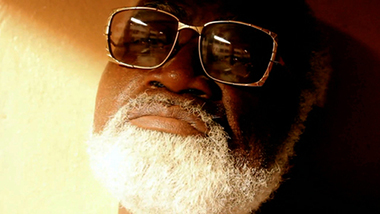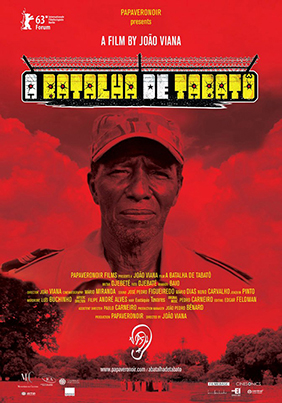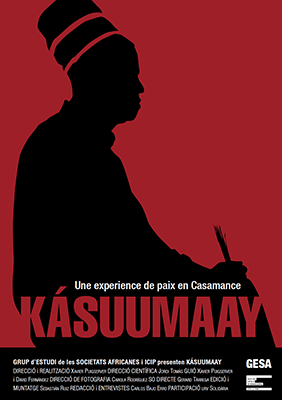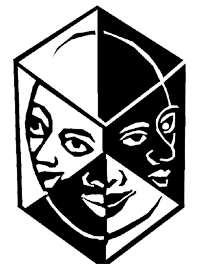AfrikPlay
27th June
With the presence of the director.
Le Président | Jean-Pierre Bekolo. 120’, Cameroon, 2013.

The disappearance of the President of Cameroon few days before the elections is a sign that the “specter” has taken over. Young people are becoming restless, old people are now telling, intellectuals are more and more debating, prisoners are planning, women feel like resisting… Why are all the unemployed youth riding moto-taxis? Why are babies being stolen in public hospitals? Why no local hero still has no name on the street and no monument? Why is such a beautiful country in so much despair? Why has the old president never been to Soweto, nor to Harlem? These are the different faces of 42 years of the same regime revealed by “the specter” , the story of succession, the story of independence, the story of revolution, the story of killing and death, the story of betrayal, the story of the people, the story of power… in one specific country… Cameroon. Because Africa is not a country, because the whole continent’s story can’t be the story of misery, poverty and diseases, the challenge is to get the media not just to tell the continent’s story differently, but to tell a different story. One country at a time, looking at the contradictions and the hope through stories of the people and their imagination. THE PRESIDENT is an attempt to reinvent the genre not just by mixing fiction and reality but also by artistic treatment in form and imagery.
Jean-Pierre Bekolo first attracted notice at the age of 25 with Quartier Mozart, a winner at Cannes and Locarno and a BFI Award nominee. For the centenary of the cinema he made Aristotle’s Plot. He directed Africa for the Future and was the creator of the video installation Une Africaine dans l’Espace at the Musée du Quai Branly in Paris. He has taught fi lm at Duke University. future husband is a well-known musician.
27th June
With the presence of the director.
The Battle of Tabatô | JoãoViana. 78’, Portugal, 2013.
2013 - Berlinale, 63 Internationale Filmfestspiele Berlin, Forum Section Competition: Special Mention for Best First Feature

Fatu’s father has returned home to Guinea-Bissau from Portugal to attend her wedding. The young woman teaches at the university and her future husband is a well-known musician. Their wedding is supposed to take place in Tabatô, a village where everyone makes music. On the way there, it becomes apparent that the father is seriously traumatised by his experiences as a soldier in the colonial war decades earlier. A post-colonial narrative in black and white and red. This visually fascinating film incorporates many documentary elements into its story: the references to the historical achievements and cultural traditions of the West African Mandinka; the engagement with the town of Tabatô and the country’s real life musicians; the images of the cinema, cemetery, harbour and marshlands. The old man carries relics from the war in his suitcase. The young people are tired of the frequent putsches. Both have left their mark on the country’s current reality. When the father finally fights his demons and the village musicians seek to banish them by playing on their balafons, it becomes a battle of war versus peace and past versus future. The film is a metaphor of the present situation in Guinea-Bissau and is located somewhere between the abysm of the war and the existence of this musical village called TABATO which is not known to the majority of the young people of Guinea-Bissau.
João Viana graduated in law at the University of Coimbra and studied cinema in Porto (1988/1994). He worked in the areas of production, sound, story-board, direction and script-writing. In 2007 he wrote the script Olhos Vermelhos for film-director Paulo Rocha, obtaining the first prize in the contest for feature films of the ICA. He worked with film directors like Oliveira, Biette, César Monteiro, Schoeter, José Alvaro, Seixas Santos and technician like Bonfanti and Joaquim Pinto. He was one of the authors (2005/2007) of the Dicionário de Cinema IberoAmericano, in 10 volumes, published by the SGAE, Madrid, and edited by Bénard da Costa of the Cinemateca Portuguesa.
He started to direct his own films, with Iana, in 2004, with the film A Piscina (in competition at the Venice Film festival), 'the Portuguese fictional short film that won the most awards ever' (Central de Informação). At present he is working on a documentary film with Paulo Branco and two film projects (already financed) that are produced by PAPAVERONOIR/Lisbon.
28th June
With the presence of the director and Scientific Director.
Kásuumaay | Xavier Puigserver (director) and Jordi Tomàs (Scientific Director). 52’, Barcelona, 2013.
Subtitles in French

For more than 30 years, there is a conflict installed in the South of Senegal, in the Casamance region. During the last three decades, the conflict has seen all kinds of evolutions and in recent years there have been various movements aimed at the achievement of peace. Partial treaties have been signed, but the conflict has not been resolved yet. Despite this confusing and ambiguous situation, there is a territory which for more than twelve years has not produced any episode of violence related with the confrontation between the secessionist Mouvement des Forces Démocratiques de la Casamance (MFDC) and the Senegalese army. It is the Kingdom of Oussouye, South of the Casamance river. The violence ceased immediately once the King was enthroned in this territory in 2.000. The film, based in a deep ethnographic study, aims to explain the struggle of the King Sibilumbay to implement kásuumaay ("peace", in Joola language) in the villages of his Kingdom and tries to show how traditional authorities can act as fully valid partners in peace processes.
Xavier Puigserver completed his B.A. degree in History and Geography at the Barcelona University in 2010 and his M.A. degree in Historical Studies at the same University two years later. In 2012 he embarked on his doctoral dissertation project on Politics, Power and the recognition of Ethnic Minorities in Mali. He has done research in Mali and Senegal.
Jordi Tomas, after reading his PhD in Cultural Anthropology in 2005 at the Autonomous University of Barcelona, he worked in the African Studies Centre of Lisbon from 2006 to 2012. He has done research in the Casamance region, among the Joola of Oussouye, for long periods during the last 13 years. Currently he works at Lleida University.
Director:
GESA (Grup d’Estudis en Societats Africanes- Universitat de Barcelona / Study Group of African Societies - Barcelona University)
Producer:
GESA (Grup d’Estudis en Societats Africanes- Universitat de Barcelona /
Study Group of African Societies - Barcelona University) and ICIP (Institut Català Internacional per la Pau / International Catalan Institute for Peace)
-Director: Xavier Puigserver (Barcelona University)
-Scientific Director: Jordi Tomàs (African Studies Centre, Lisbon / Lleida University).

 Site
by NomadIT
Site
by NomadIT